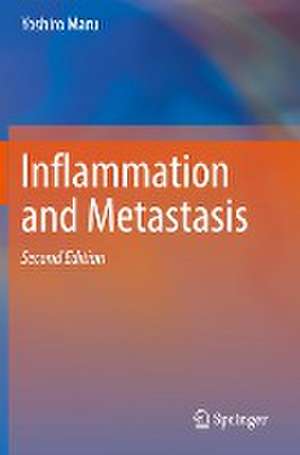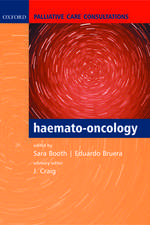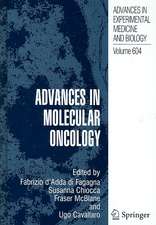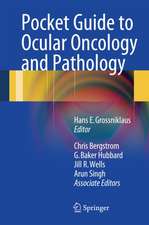Inflammation and Metastasis
Autor Yoshiro Maruen Limba Engleză Paperback – 8 oct 2022
Homeostasis, originated from an idea of internal milieu by Claude Bernard, is eventually maintained by endogenous elements. The essential features of inflammation are leukocyte mobilization and increased vascular permeability, which could take place in many homeostatic or physiological conditions at low levels. Homeostatic inflammation is a concept to explain pathological settings such as metastasis in which irrespective of its level those inflammatory features are misused with endogenous molecules (see Chap. 14,15).
As inflammation comprises many biological fields, targeting a single molecule for a disease could potentially make a therapeutic contribution to other diseases. For example, one focus is applied here to the roles of calprotectin in lung metastasis, which is implicated in psychiatric disorders and COVID-19 as shown by recent evidence.
| Toate formatele și edițiile | Preț | Express |
|---|---|---|
| Paperback (2) | 1002.10 lei 38-44 zile | |
| Springer – 29 mai 2018 | 1002.10 lei 38-44 zile | |
| Springer Nature Singapore – 8 oct 2022 | 1425.89 lei 6-8 săpt. | |
| Hardback (2) | 1123.87 lei 3-5 săpt. | |
| Springer – aug 2016 | 1123.87 lei 3-5 săpt. | |
| Springer Nature Singapore – 7 oct 2021 | 1435.90 lei 3-5 săpt. |
Preț: 1425.89 lei
Preț vechi: 1500.93 lei
-5% Nou
Puncte Express: 2139
Preț estimativ în valută:
272.87€ • 283.27$ • 227.53£
272.87€ • 283.27$ • 227.53£
Carte tipărită la comandă
Livrare economică 22 martie-05 aprilie
Preluare comenzi: 021 569.72.76
Specificații
ISBN-13: 9789811617591
ISBN-10: 9811617597
Pagini: 518
Ilustrații: XX, 518 p. 81 illus., 33 illus. in color.
Dimensiuni: 155 x 235 mm
Greutate: 0.82 kg
Ediția:2nd ed. 2021
Editura: Springer Nature Singapore
Colecția Springer
Locul publicării:Singapore, Singapore
ISBN-10: 9811617597
Pagini: 518
Ilustrații: XX, 518 p. 81 illus., 33 illus. in color.
Dimensiuni: 155 x 235 mm
Greutate: 0.82 kg
Ediția:2nd ed. 2021
Editura: Springer Nature Singapore
Colecția Springer
Locul publicării:Singapore, Singapore
Cuprins
Chapter 1 General Thinking About Inflammation.- Chapter 2 Inflammation from the Standpoint of Leukocytes.- Chapter 3 Vessels and Coagulation.- Chapter 4 Sterile Inflammation.- Chapter 5 Issue of Self and Non-self.- Chapter 6 Extension of Endogenous Field.- Chapter 7 Evidence for Existence of Endogenous TLR4 Ligands.- Chapter 8 Autoinflammatory Disorders.- Chapter 9 Cancer in General.- Chapter 10 Basic Research.- Chapter 11 Tumor Microenvironment.- Chapter 12 Whole-Body Matter.- Chapter 13 Premetastatic Microenvironment.- Chapter 14 What Is Homeostasis?.- Chapter 15 Explanation of Metastasis by Homeostatic Inflammation.- Chapter 16 Therapeutic Potential.
Notă biografică
Maru, Yoshiro
Department of Pharmacology, Tokyo Women’s Medical University
Textul de pe ultima copertă
This book, now in a thoroughly revised and updated second edition, provides the latest information on cancer metastasis from the perspective of inflammation and presents new ideas on the complicated mechanisms of metastasis and potential therapeutic targets. Key features include discussion of mechanisms recently identified to be involved in the resolution phase of inflammation, presentation of the latest evidence regarding the roles of endogenous TLR4 ligands in metastasis, and thorough explanation of the concept of homeostatic inflammation and current understanding of the significance of its dysregulation for metastasis. Structure-based thinking is another important element of the book, and it is proposed that inflammation forms a functional triangle with angiogenesis and coagulation, at the center of which cancer is located. Examples of the many additional specific topics covered in this edition include the functional involvement of new types of RNA in cancer, the insights offered by recent advances in bioinformatics, and the potential of a casein kinase 1α inhibitor in the treatment of acute myeloid leukemia. The book will be a valuable update and resource for both experienced and younger researchers.
Homeostasis, originated from an idea of internal milieu by Claude Bernard, is eventually maintained by endogenous elements. The essential features of inflammation are leukocyte mobilization and increased vascular permeability, which could take place in many homeostatic or physiological conditions at low levels. Homeostatic inflammation is a concept to explain pathological settings such as metastasis in which irrespective of its level those inflammatory features are misused with endogenous molecules (see Chap. 14,15).
As inflammation comprises many biological fields, targeting a single molecule for a disease could potentially make a therapeutic contribution to other diseases. For example, one focus is applied here to the roles of calprotectin in lung metastasis, which is implicated in psychiatric disorders and COVID-19 as shown by recent evidence.
Homeostasis, originated from an idea of internal milieu by Claude Bernard, is eventually maintained by endogenous elements. The essential features of inflammation are leukocyte mobilization and increased vascular permeability, which could take place in many homeostatic or physiological conditions at low levels. Homeostatic inflammation is a concept to explain pathological settings such as metastasis in which irrespective of its level those inflammatory features are misused with endogenous molecules (see Chap. 14,15).
As inflammation comprises many biological fields, targeting a single molecule for a disease could potentially make a therapeutic contribution to other diseases. For example, one focus is applied here to the roles of calprotectin in lung metastasis, which is implicated in psychiatric disorders and COVID-19 as shown by recent evidence.
Caracteristici
Explains the concept of homeostatic inflammation and explores the significance of its dysregulation for metastasis
Presents new information from multiple research fields
Discusses novel potential therapeutic targets
Presents new information from multiple research fields
Discusses novel potential therapeutic targets












